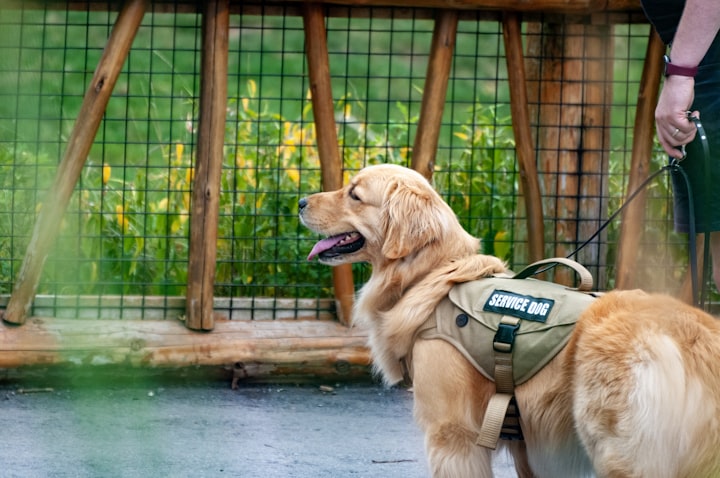Training Psychiatric Service Dogs
An Informational Article
I had the idea for this article several years ago, but here recently I have had the overwhelming urge to write it as I have been faced with reports of several "professionals" (whether lawyers or doctors or even staff at libraries or restaurants) having insistence on knowing what certification the dog has passed, stating that in order to be a service dog that it has to have special papers, or deeming a well-behaved service dog unwelcome simply because it has no identification.
Before I dive into this, I will say that I am all for do it yourself - IF you do it properly. If you cannot train a dog, that is fine, but then don't pretend that the dog is trained. I can see the effects of poorly trained "service animals" everywhere and can see the reasoning behind referring people to training organizations. This is not meant to be a one size fit all response - and we shouldn't treat everyone with a one-size-fits-all mentality as that is not true accommodation.
I also can only personally speak to my experiences training my own psychiatric service dogs/miniature horse and what I have been referred to as guidelines by the ADA staff when I have called with questions.
As you have to be disabled to qualify for a service animal with a condition that said service animal (typically a dog) can help mitigate, it quite likely means that you are low-income. If the government were to ever mandate licensure, most people who would need the assistance would not be able to afford a service dog as a simple Google search puts the cost to professionally train a service dog into the tens of thousands. That is completely unattainable for someone like me with no majorly higher income family to help me pay for a dog.
Having the ability to buy and train my own dog is not exactly cheap either:
- A puppy costs about $750 in my area as rescues tend to frown on "working" dogs and even rescues charge $300 or more for a puppy/young dog
- A puppy will take at least 120 hours of training (my first service dog had 8 hours of basic obedience class time over 8 weeks plus the 15 minutes 2-3 times a day to work on the concepts during and 4 weeks after the class = 53 hours right there; 8 hours advanced obedience class time over 8 weeks to hone her focus on me even off of leash plus the 15 minutes 2-3 times a day to work on the concepts during and 4 weeks after that class = another 53 hours; 6 hours public accessibility training over 6 weeks plus the time I spent working with her using tarps to walk on, obstacles, loud noises, etc. and now we are at a total of around 120 hours BEFORE training for specific tasks to mitigate my disability and that doesn't account for potty training time!)
- Each of those professionally lead classes cost me $80-120 for the class (back from 2010-2012), plus the time I had to put into my dog's training (minimum wage was about $7 an hour and that adds up), vetting is about $120 a year (for the basics), and dog food costs money too! It comes in to a total of around $2500 for a now 2 year old dog that still hasn't had service related task training and it is a lot of work... but that is still much more affordable than $10-25K (Google's estimate)!
Plus, according to the ADA's FAQ (Question #5): "People with disabilities have the right to train the dog themselves and are not required to use a professional service dog training program." And Question #17 clarifies the issue regarding so-called documentation: "Covered entities may not require documentation, such as proof that the animal has been certified, trained, or licensed as a service animal, as a condition for entry. " According to the ADA Requirements on Service Animals, "Under the ADA, State and local governments, businesses, and nonprofit organizations that serve the public generally must allow service animals to accompany people with disabilities in all areas of the facility where the public is allowed to go."
When "professionals" insist that clients and customers have documentation, not only is it against the law, it is also quite arrogant, rude, and stigmatic. I mean, how cruel would it be to demand to know the make and model of the wheelchair someone uses to access your business? Or how badly would it look to say only a certain type of wheelchair was allowed? What would you expect out of someone if you demanded that they leave their eyeglasses outside unless they had a prescription that you had to inspect before allowing such things in your place of business?
When you, as a professional, cannot see my (or other's) disabilities, the ADA FAQ tells us: (Question #7) "In situations where it is not obvious that the dog is a service animal, staff may ask only two specific questions: (1) is the dog a service animal required because of a disability? and (2) what work or task has the dog been trained to perform?" It goes on to reaffirm that "staff are not allowed to request any documentation for the dog, require that the dog demonstrate its task, or inquire about the nature of the person’s disability."
To give you an example of a task by a psychiatric service dog, the ADA Requirements on Service Animals states that two examples of tasks can be "reminding a person with mental illness to take prescribed medication" or "calming a person with Post Traumatic Stress Disorder (PTSD) during an anxiety attack" and goes on to say that "service animals are working animals, not pets. The work or task a dog has been trained to provide must be directly related to the person’s disability."
Now, for the people who are worried about unprofessionally, bad behaved service dogs, the ADA Requriments on Service Animals states that "A person with a disability cannot be asked to remove his service animal from the premises unless: (1) the dog is out of control and the handler does not take effective action to control it or (2) the dog is not housebroken." So, regardless if you have a professionally trained service dog or you trained it yourself, if the dog is not behaving appropriately, you must leave. Kind of like if you aren't behaving properly too! *smile*
Now if you know me, I currently have a miniature horse as a service animal. As I have had to explain to multiple people (some multiple times) the ADA Requirements on Service Animals has a section on miniature horses that you can read here.
I also am training in another service dog and have been faced with the assumption that you can only have 1 service animal. The ADA FAQ's page answers this under Question #13: "Some people with disabilities may use more than one service animal to perform different tasks." While my service dog and service miniature horse will perform similar duties, I want to add a service dog back in as it is easier for them to navigate steps (my town has many businesses that cannot accommodate my miniature horse or a wheelchair) and it'll be easier to travel long distances with a dog versus a miniature horse due to the simple fact that dogs can "hold it" between potty breaks longer. I will also not be asking facilities to accommodate both service animals since they will be trained for the same/similar tasks. I will keep my service miniature horse as she has the capability to force me to stay and deal with a panic attack with deep pressure assistance as well as the lifespan to work with me as a constant for the next 15-20 years versus a dog's working span of about 8 years (Paving the Path Toward Retirement for Assistance Animals).
In conclusion, I am hopeful that by writing this article and by sharing my experience that it will help end the stigmatic idea that only professionally trained service dogs are really service dogs as well as the misinformation touted by numerous "professionals" regarding the necessity of providing proof of service dog certification. My hope is that you can use these resources to educate your friends, family, and co-workers and make the world just a little bit more welcoming to people with disabilities (or the differently abled, as one of my college instructors called it)!
About the Creator
The Schizophrenic Mom
I am a mother of 2 precious angels who drive me slightly more crazy
than I already am with a diagnosis of schizophrenia.
When asked "are you crazy?!" my favorite come back is:
"yes! And I have the papers to prove it! How about you?" LOL







Comments (1)
I am glad that you wrote this article. It is very informative.